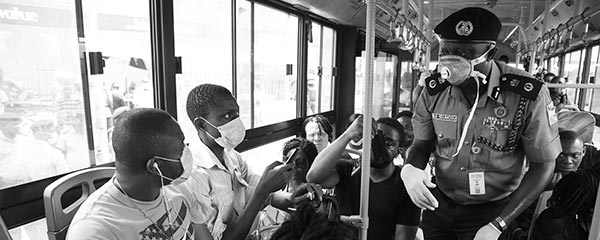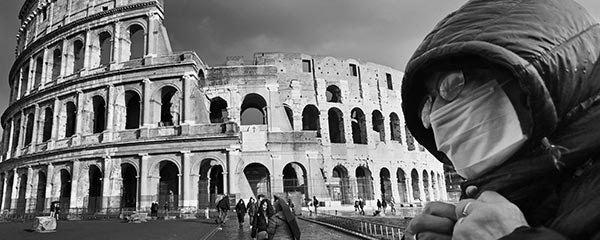Story Highlights
- 44% in Latin America are satisfied with access to quality healthcare
- 36% in Latin America are confident in their national governments
WASHINGTON, D.C. -- Although most of the recent discussions about the spread of COVID-19 have been focused on its neighbor to the North, Latin America is emerging as the next front in the battle against the disease, and it is doing so at a disadvantage.
Latin America and the Caribbean is one of the two regions in the world where -- prior to the crisis -- less than 50% of the population was confident or satisfied with two elements that are crucial to combating the virus: the national government and people's access to quality healthcare. This is true in the Middle East and North Africa as well, but notably, both measures are worse in Latin America and the Caribbean.
| Satisfied with healthcare | Confident in national government | ||||||||||||||||||||||||||||||||||||||||||||||||||||||||||||||||||||||||||||||||||||||||||||||||||
|---|---|---|---|---|---|---|---|---|---|---|---|---|---|---|---|---|---|---|---|---|---|---|---|---|---|---|---|---|---|---|---|---|---|---|---|---|---|---|---|---|---|---|---|---|---|---|---|---|---|---|---|---|---|---|---|---|---|---|---|---|---|---|---|---|---|---|---|---|---|---|---|---|---|---|---|---|---|---|---|---|---|---|---|---|---|---|---|---|---|---|---|---|---|---|---|---|---|---|---|
| % | % | ||||||||||||||||||||||||||||||||||||||||||||||||||||||||||||||||||||||||||||||||||||||||||||||||||
| Southeast Asia | 81 | 74 | |||||||||||||||||||||||||||||||||||||||||||||||||||||||||||||||||||||||||||||||||||||||||||||||||
| Western Europe | 77 | 47 | |||||||||||||||||||||||||||||||||||||||||||||||||||||||||||||||||||||||||||||||||||||||||||||||||
| East Asia | 76 | 40 | |||||||||||||||||||||||||||||||||||||||||||||||||||||||||||||||||||||||||||||||||||||||||||||||||
| Northern America | 74 | 38 | |||||||||||||||||||||||||||||||||||||||||||||||||||||||||||||||||||||||||||||||||||||||||||||||||
| South Asia | 68 | 76 | |||||||||||||||||||||||||||||||||||||||||||||||||||||||||||||||||||||||||||||||||||||||||||||||||
| East Central & South East Europe | 55 | 44 | |||||||||||||||||||||||||||||||||||||||||||||||||||||||||||||||||||||||||||||||||||||||||||||||||
| Middle East & North Africa | 48 | 48 | |||||||||||||||||||||||||||||||||||||||||||||||||||||||||||||||||||||||||||||||||||||||||||||||||
| Sub-Saharan Africa | 48 | 60 | |||||||||||||||||||||||||||||||||||||||||||||||||||||||||||||||||||||||||||||||||||||||||||||||||
| Post-Soviet Eurasia | 45 | 51 | |||||||||||||||||||||||||||||||||||||||||||||||||||||||||||||||||||||||||||||||||||||||||||||||||
| Latin America & Caribbean | 44 | 36 | |||||||||||||||||||||||||||||||||||||||||||||||||||||||||||||||||||||||||||||||||||||||||||||||||
| Gallup World Poll, 2019 | |||||||||||||||||||||||||||||||||||||||||||||||||||||||||||||||||||||||||||||||||||||||||||||||||||
Latin American Countries at Most Risk from COVID-19
The widespread disruption and soaring death rates from the disease in Ecuador in just the past few weeks show the potentially devastating outcome that may occur in other countries throughout the broader region. Ecuador itself stands out in the region for residents' low confidence in their national government (21%) and satisfaction with the availability of quality healthcare (43%), but based on these two measures, other countries are at far more risk.
Chief among these is Venezuela, where the healthcare system and the government have operated on the edge of collapse for years before COVID-19. In 2019, 18% of Venezuelans said they were satisfied with the availability of quality healthcare where they live -- which was the lowest level in the entire world last year -- and 26% expressed confidence in their government. The global pandemic may be the one-two punch that turns the crisis in the country into a disaster -- particularly as it absorbs the Venezuelan refugees who are fleeing the virus in other countries and returning home.
| Satisfied with healthcare | Confident in national government | ||||||||||||||||||||||||||||||||||||||||||||||||||||||||||||||||||||||||||||||||||||||||||||||||||
|---|---|---|---|---|---|---|---|---|---|---|---|---|---|---|---|---|---|---|---|---|---|---|---|---|---|---|---|---|---|---|---|---|---|---|---|---|---|---|---|---|---|---|---|---|---|---|---|---|---|---|---|---|---|---|---|---|---|---|---|---|---|---|---|---|---|---|---|---|---|---|---|---|---|---|---|---|---|---|---|---|---|---|---|---|---|---|---|---|---|---|---|---|---|---|---|---|---|---|---|
| % | % | ||||||||||||||||||||||||||||||||||||||||||||||||||||||||||||||||||||||||||||||||||||||||||||||||||
| Uruguay | 73 | 55 | |||||||||||||||||||||||||||||||||||||||||||||||||||||||||||||||||||||||||||||||||||||||||||||||||
| Nicaragua | 67 | 51 | |||||||||||||||||||||||||||||||||||||||||||||||||||||||||||||||||||||||||||||||||||||||||||||||||
| Costa Rica | 63 | 28 | |||||||||||||||||||||||||||||||||||||||||||||||||||||||||||||||||||||||||||||||||||||||||||||||||
| Jamaica | 62 | 44 | |||||||||||||||||||||||||||||||||||||||||||||||||||||||||||||||||||||||||||||||||||||||||||||||||
| Dominican Republic | 59 | 41 | |||||||||||||||||||||||||||||||||||||||||||||||||||||||||||||||||||||||||||||||||||||||||||||||||
| El Salvador | 54 | 72 | |||||||||||||||||||||||||||||||||||||||||||||||||||||||||||||||||||||||||||||||||||||||||||||||||
| Guatemala | 54 | 46 | |||||||||||||||||||||||||||||||||||||||||||||||||||||||||||||||||||||||||||||||||||||||||||||||||
| Honduras | 52 | 36 | |||||||||||||||||||||||||||||||||||||||||||||||||||||||||||||||||||||||||||||||||||||||||||||||||
| Argentina | 52 | 27 | |||||||||||||||||||||||||||||||||||||||||||||||||||||||||||||||||||||||||||||||||||||||||||||||||
| Mexico | 51 | 50 | |||||||||||||||||||||||||||||||||||||||||||||||||||||||||||||||||||||||||||||||||||||||||||||||||
| Panama | 50 | 41 | |||||||||||||||||||||||||||||||||||||||||||||||||||||||||||||||||||||||||||||||||||||||||||||||||
| Bolivia | 48 | 30 | |||||||||||||||||||||||||||||||||||||||||||||||||||||||||||||||||||||||||||||||||||||||||||||||||
| Paraguay | 48 | 21 | |||||||||||||||||||||||||||||||||||||||||||||||||||||||||||||||||||||||||||||||||||||||||||||||||
| Ecuador | 43 | 21 | |||||||||||||||||||||||||||||||||||||||||||||||||||||||||||||||||||||||||||||||||||||||||||||||||
| Colombia | 42 | 33 | |||||||||||||||||||||||||||||||||||||||||||||||||||||||||||||||||||||||||||||||||||||||||||||||||
| Brazil | 39 | 34 | |||||||||||||||||||||||||||||||||||||||||||||||||||||||||||||||||||||||||||||||||||||||||||||||||
| Peru | 39 | 23 | |||||||||||||||||||||||||||||||||||||||||||||||||||||||||||||||||||||||||||||||||||||||||||||||||
| Chile | 28 | 15 | |||||||||||||||||||||||||||||||||||||||||||||||||||||||||||||||||||||||||||||||||||||||||||||||||
| Venezuela | 18 | 26 | |||||||||||||||||||||||||||||||||||||||||||||||||||||||||||||||||||||||||||||||||||||||||||||||||
| Gallup World Poll, 2019 | |||||||||||||||||||||||||||||||||||||||||||||||||||||||||||||||||||||||||||||||||||||||||||||||||||
Chile, Ecuador and Peru are also in a compromised position to face COVID-19, judging by their residents' evaluations of their healthcare systems and governments prior to the pandemic. All three countries were just starting to recover from episodes of severe instability in 2019. These three countries have also been on the receiving end of a massive exodus of Venezuelan refugees and migrants over the past five years, which has severely strained their healthcare resources and social programs.
Brazil, the region's most populous country, is also among the most at-risk countries in Latin America in terms of satisfaction with healthcare or confidence in government. While fewer than four in 10 Brazilians are content with either, additional factors may exacerbate Brazil's risk. President Jair Bolsonaro has downplayed the risk that the disease poses, most recently appearing at a demonstration on Sunday, where protesters railed against stay-at-home orders and called for military rule. This stance, and the closely packed populations of the country's favelas, make millions of Brazilians particularly vulnerable to COVID-19.
Implications
Latin American countries face significant challenges in controlling the spread and effects of COVID-19. Across the region, low levels of trust in government suggest populations are unlikely to trust the advice they receive from the government concerning efforts to restrict movement and the spread of the disease, or to trust the government's ability to enact the right policies.
Additionally, Latin American populations' low levels of satisfaction with the availability of quality healthcare speak to a likely lack of effective medical treatment throughout the region. This is in addition to large majorities of Latin America's workforce not enjoying the job stability and security of formal full-time employment that would be necessary to observe long periods of shelter-in-place measures.
These factors have been exacerbated by a lack of effective action to control the spread of the disease on the part of several countries in the region. Failure to act risks higher levels of infection that will further tax already stretched healthcare systems, making situations similar to those that have already occurred in Ecuador more likely in other countries throughout the region.
The spread of COVID-19 may also be particularly devastating to Venezuela. With no effective means of providing healthcare to its population, a true humanitarian disaster may occur. Refugees from the country who had fled to neighboring countries have also returned home due to worsening economic conditions and lack of access to healthcare, potentially further stretching the country's meager resources.
This configures a grim outlook for a region that was already struggling to resume economic growth, and that saw democracies tumble in several countries in 2019 over residents' frustrations with unmet social demands.
For complete methodology and specific survey dates, please review Gallup's Country Data Set details.
Learn more about how the Gallup World Poll works.




